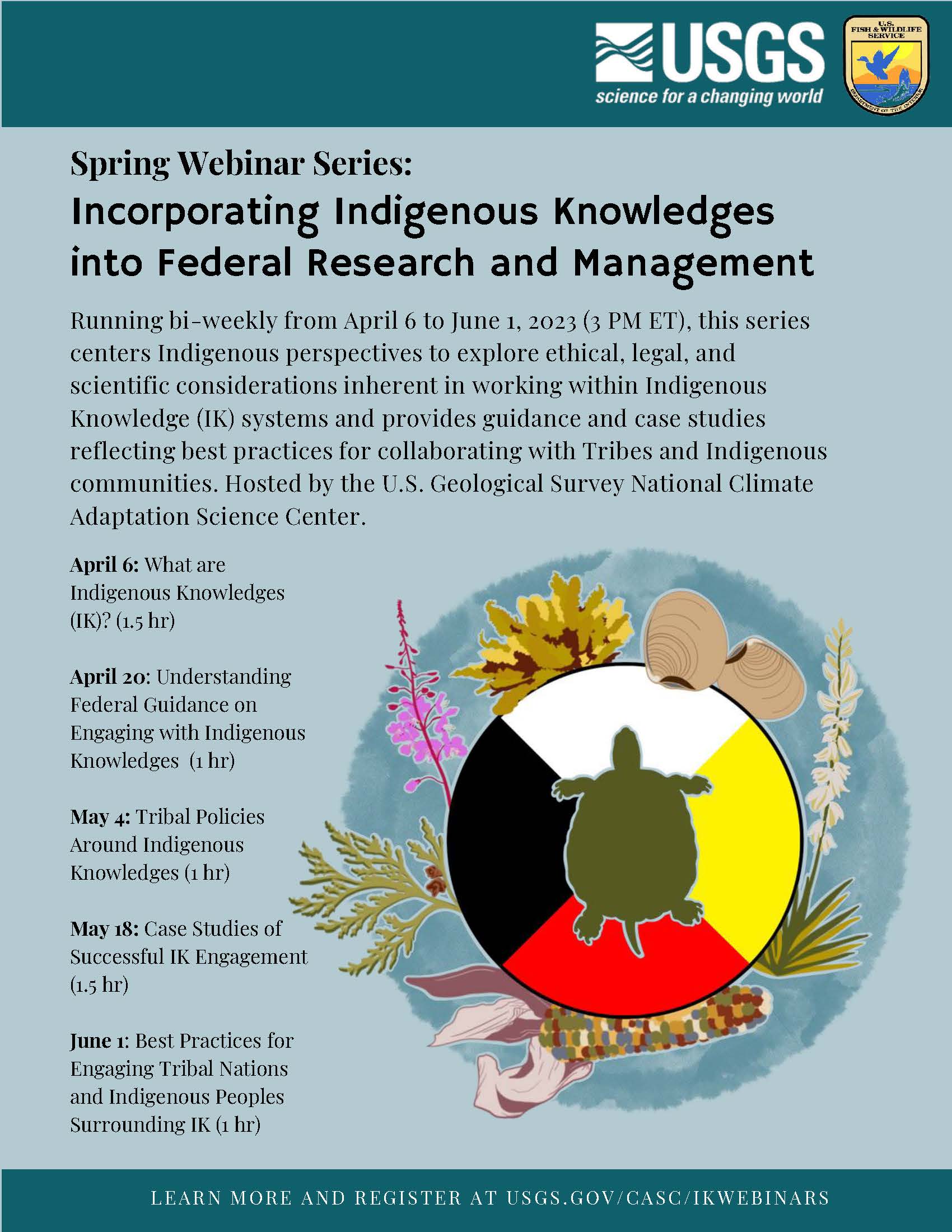
- This event has passed.
Incorporating Indigenous Knowledges into Federal Research and Management

May 4th: Tribal Policies Around Indigenous Knowledges
Aaron Jones (Tulalip Tribes) Ann Marie Chischilly (Institute for Tribal Environmental Professionals; Northern Arizona University) Bobby Saunkeah (Chickasaw Nation)
Registration: https://www.usgs.gov/programs/climate-adaptation-science-centers/webinar-series-incorporating-indigenous-knowledges
The U.S. Geological Survey (USGS) National Climate Adaptation Science Center (National CASC) is hosting a virtual webinar series on how to integrate Indigenous Knowledges (IK) into Federal ecological research and resource management programs. Running bi-weekly from April 6 to June 1, 2023 (3 PM ET), this series centers Indigenous perspectives to explore ethical, legal, and scientific considerations inherent in working within different knowledge systems and provides guidance and case studies reflecting best practices for collaborating with Tribes and Indigenous communities.
Ann Marie Chischilly is the Executive Director at the Institute for Tribal Environmental Professionals (ITEP). She is responsible for managing ITEP’s work with Northern Arizona University, state and federal agencies, tribes and Alaska Native villages. Ms. Chischilly currently serves on several federal advisory committees including the Environmental Protection Agency’s (EPA) National Advisory Committee, the Advisory Committee for the Sustained National Climate Assessment (Now the Independent Advisory Committee on the Sustained National Climate Assessment) and EPA’s National Safe Drinking Water Council. From 2013 to 2015, Ms. Chischilly also served on Department of Interior’s Advisory on Climate Change and Natural Resource Science. Ms. Chischilly speaks both nationally and internationally on topics of Indian Law, Environmental Law, Tradition Knowledges, Water Law and Tribes/Indigenous Peoples. She works with the United Nations on issues of the Protection of Traditional Knowledge and co-wrote, “Guidelines for the Use of Traditional Knowledge in Climate Change Initiatives . ” Before coming to ITEP, she served for over ten years as Senior Assistant General Counsel to the Gila River Indian Community (Community), where she assisted the Community in implementing the historic “Arizona Water Settlement Act” and founded the Community’s Renewable Energy Team. Ms. Chischilly is an enrolled member of the Navajo Nation (Diné). She earned her Juris Doctorate degree from St. Mary’s University School of Law and a Masters in Environmental Law (LL.M) from Vermont Law School. She is licensed in Arizona and has practiced in state, district, and federal courts. She is also a member of the International Bar Association.
Bobby Reed Saunkeah is Kiowa. He is a graduate of the University of Oklahoma College of nursing and completed his graduate work in bioethics from Creighton University. Mr. Saunkeah began his employment with the Chickasaw Nation in 1997 as a registered nurse at the Carl Albert Indian Health facility in Ada. He subsequently served as diabetes educator, manager of the Diabetes Care Center, and manager of the department of Epidemiology, Research and Population Health. He is presently the director of the Research and Public Health division. Mr. Saunkeah serves as chair for the Chickasaw Nation Institutional Review Board (IRB), the body that reviews research projects in the Chickasaw Nation. He is a tribal representative on the National Indian Health Service IRB, a Certified IRB Professional (CIP) and adjunct faculty in the Department of Health Promotion at the OU College of Public Health. He was recently appointed to his fourth term as the Oklahoma City Area delegate to the National Institutes of Health Tribal Advisory Committee for research. His primary interests are promoting tribal public health, creating tribal research infrastructure, strengthening research protections in tribal communities, and exploring the application of research and public health ethics principles within the context of tribal culture and sovereignty.